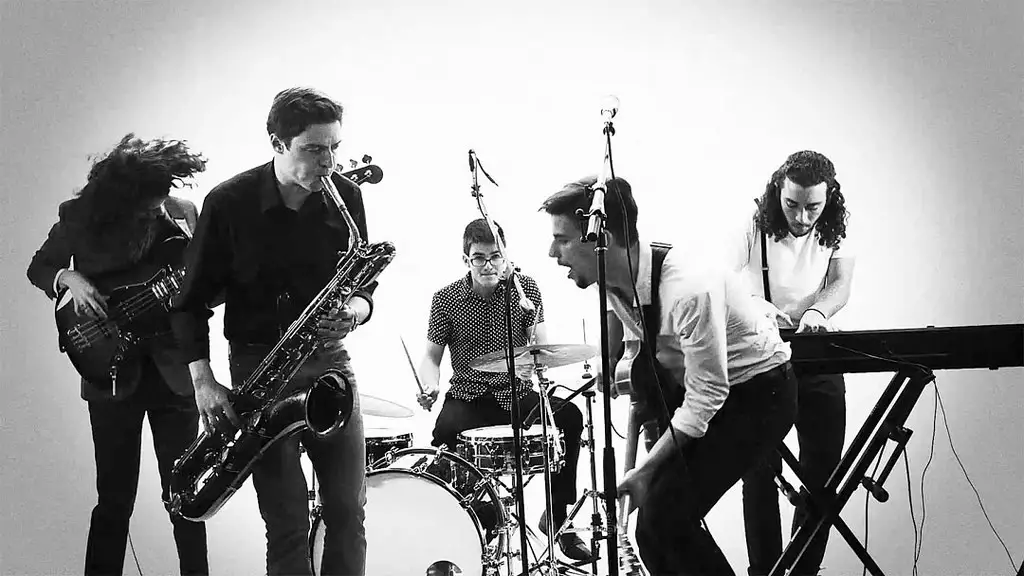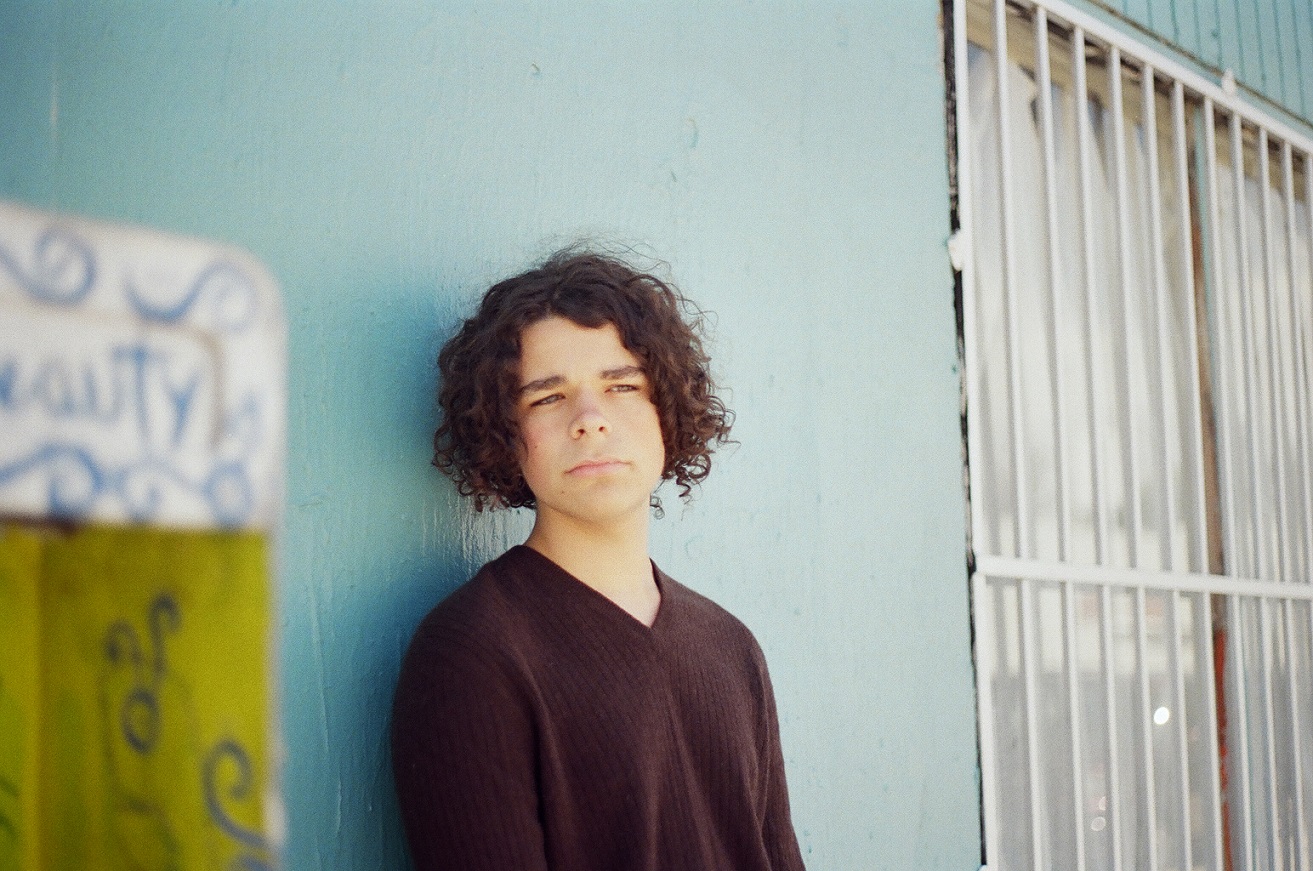Recorded over the span of a decade, the iconic voice of Portishead, Beth Gibbons, foregoes her familiar sonic territories in favor of organic, unconventional arrangements on debut solo album ‘Lives Outgrown.’
Stream: ‘Lives Outgrown’ – Beth Gibbons
I never had the chance to explain exactly what I meant.
And this perhaps speaks more to the time than anything else. 16 years ago. More than a lifetime ago for some — more than a number of lifetimes ago for myself. But on April 29th, 2008 — a Tuesday, I left work over my lunch break and drove across town to Target to purchase a copy of Third, by Portishead, on CD.
This, of course, speaks to the time more than anything else. That long before the resurgence of vinyl, that one could walk into a Target, and browse what was, in the mid-2000s, a rather robust selection of compact discs, and that they often had a surprising variety of the week’s new releases available.
This, of course, speaks to the time more than anything else. That new albums were released in the United States on Tuesdays.
And I do not believe, at the time, I thought very much of it, but retrospectively, nearly two decades later, it is just kind of preposterous to give this consideration—that I could wander into a department store, like Target, and purchase a copy of an album by Portishead.
And, I mean, yes, Third, unlike their debut and its follow up, was released via a major label—the now defunct Mercury Records logo can be found on the back cover along with the copyright information. So, it does make sense. Kind of. That a major label release, from a band that had not issued a new studio album in 11 years, would find placement, at least on the day of its release, at Target.
And yet. The preposterous part. Portishead is popular. Yes. Like, they have an audience. And even if you don’t think you have heard a song by Portishead, there is a good chance you have because “Glory Box,” for starters, has appeared in both film and television shows. But. They are not like the kind of name that, I think, the average Target shopper would recognize when they were pushing a cart full of groceries, and home goods, past the “Entertainment” department.
This of course speaks to the time more than anything else. That people still regularly purchased and listened to compact discs—or consumed physical media of any kind, really.
I was a bad fan — or one that could not wait until April 28th. Because I had, in fact, downloaded a leaked copy of Third shortly before it arrived in stores. And I think that, if I remember correctly, I was confused about the album’s jittery opening track, “Silence,” which, as it played off of my laptop, downloaded from a message board, cut off at the end abruptly before going into the next song.
Certainly, I thought, that could not be how the song actually ended. Which was part of the reason that I had driven to Target, over my lunch hour, to purchase Third on CD. Only to find that, the song “Silence” does, in fact, just abruptly cut off.
16 years later, I still have never truly connected with Third—I like it more now than I did in 2008, when I think that, more than anything, it was an album that confused me. Long gone were the “trip-hop” aesthetics of Portishead’s debut full-length, Dummy, and its self-titled follow-up—but, really, long gone was trip-hop as a genre. It was a sound indicative of a specific time that the frontrunners of the sound (Portishead, Massive Attack, Tricky, et. al) had all more or less grown out of before the start of the 2000s.
Third is murky—intentionally engineered and produced to sound a little scratchy, and a little muffled. It sounds like it is coming from a few rooms away from the one you are standing in, and you are straining as best you can to make out what is happening.
It seems strange to say it, and maybe this makes sense, but I find that Third is a record that I think about more than I find I listen to. Specifically, certain moments across the album—like the abrasive, noisy, explosive bursts of electronic percussion that course through the single “Machine Gun.” But more than anything, I find myself thinking about the pulsating, hypnotic, eerie, and icily melancholic song “Nylon Smile.”
It, too, ends abruptly, with the instrumentation stopping before the group’s iconic frontwoman, Beth Gibbons, finishes the song’s final line, which then hangs in the ether in a way that is difficult if not impossible to shake. “I can’t see nothing good. Nothing is so bad. I never had the chance to explain exactly what I meant.”

* * *
I’ve told you before: nostalgia is a relentless hustler. Relies on how bad anyone wants to retrieve a feeling, or even an idea of a feeling.
– Hanif Abdurraqib
And maybe it is purely coincidental, but it is fitting, I suppose, that in the year Portishead’s debut full-length, Dummy, will celebrate its 30th anniversary, and just a few weeks after the group remastered and reissued (on CD and vinyl) their seminal live album for its 25th anniversary, Beth Gibbons released her first solo album — Lives Outgrown.
A quick point of clarification — Lives Outgrown is the first album Gibbons is releasing under her own name, and her own name alone; Out of Season, the album she released in 2002 with Rustin Man – Paul Webb of Talk Talk – is, by all accounts, considered a collaborative effort and not a solo endeavor.
For the vocalist from a group that has not released a new full-length album in 16 years, to put out a solo album with the title Lives Outgrown, does honestly seem to imply something about the future sustainability of her work in Portishead. But that is, perhaps, just reading between the lines when it is not necessary to do so.
The truth, though, I think is that it the title comes from the idea that runs throughout the album’s 10 tracks—it is about reflection on a life and of mortality. Of Gibbons’ own, as well as of others.
A collection of songs allegedly (according to the album’s press materials) in the making for a decade, Lives Outgrown is the result of close collaboration with producer and multi-instrumentalist James Ford, as well as a different member of Talk Talk, Lee Harris, who provides drums and percussive elements across the record.
And it is, at least before sitting down with the record, difficult to fathom Gibbons working Lives Outgrown for close to 10 years, but after listening, there are moments within where I feel like you can really tell—her voice has always been dynamic in terms of the range and affect she could sing with, and that is certainly present here. But. There are places where it sounds like her voice is just slightly more weathered than in other places—creating these snapshots of the time when the song was presumably written and recorded.
Portishead, in the past, were not ones to give in to the impulse for nostalgia. Previous “milestone” anniversaries for both Dummy and the self-titled album came and went, and the 25th anniversary reissue of Roseland NYC Live is the first time the band has looked back on a release in their small body of work with this kind of outward affinity.
Gibbons, too, in the long gestation of Lives Outgrown, is not one for the nostalgia of the sounds she might be most synonymous with—or, at least, with this record, wishes to distance herself from the eerie, alluring sounds that she helped craft—something that was apparent within the first single issued off of the album, “Floating in A Moment.”
And it is a sentiment found within the press release for Lives Outgrown as well, wherein the opening paragraph, Gibbons recalls her attempts to find the right kind of percussive sound. In, apparently, wanting to “get away from breakbeats,” she is quoted as saying she “can’t be doing with the snare anymore” before adding, “A lot of beats are irritating these days because they are rinsed.”
Nostalgia is a relentless hustler.

* * *
From this moment, how could it feel this wrong?
And, as Portishead’s debut full-length is on the cusp of celebrating its 30th anniversary, I, admittedly, was certainly, entirely too young to listen to Dummy upon its arrival in the late summer of 1994, let alone even be cognizant of who Portishead was at the time. That summer, I was 10, going on 11, and yes, I had access to MTV and bought cassettes from The Breeders—simply because of “Cannonball,” and Sonic Youth, because of the edgy infectiousness of “Bull in The Heather,” though my 11-year-old brain was not ready for Experimental Jet Set, Trash, and No Star. But. The burgeoning genre trip-hop was something that, at this point, I was totally unaware of.
Massive Attack—arguably the other marquee name of the early days of sound and aesthetic, seemed to, at least in the early to mid-1990s, have their name out in the larger zeitgeist a little bit more, with placement on soundtracks for summer blockbusters like, of all things, Batman Forever, in 1995, and the following year, Mission: Impossible, as well as their name attached to the production of Madonna’s sultry, smoldering cover of Marvin Gaye’s “I Want You.”
And what have a memory of is not the release of Portishead, in the autumn of 1997, but rather, when the band was the musical guest on “Saturday Night Live” at the start of 1998, in an episode hosted by Sarah Michelle Gellar.
I didn’t watch the performance—I would have been 14, at the time. And. Yes. My musical horizons had opened up quite a bit between 1994 and 1997. But I can look back and be honest about myself enough that, when I was a depressed and overweight high school freshman, wearing baggy jeans and a long chain dangling off of my wallet, I am confident that I would have not been ready to comprehend the soundscapes of Beth Gibbons and her Portishead bandmates, Geoff Barrow and Adrian Utley.
And, if you are of a certain age, perhaps you remember the idea of “record clubs.” There were three, at one time, but primarily, there are two that, if you remember the idea, you remember the names—BMG and Columbia House. Mail order services where you could subscribe, or join, and purchase a certain amount of CDs (early on, it was vinyl LPs and cassettes) for, like, a penny each, which committed you, if you were to read the fine print, to buying a certain amount of CDs at full price within a certain amount of time.
My parents were early adopters of the compact disc. I think that we were already receiving things from Columbia House when I was very young, but by the ages of six or seven, we quickly built up the family’s CD collection through BMG. After my parents split up in the mid-1990s, my mother would, occasionally, still order things from one or the other record clubs we were still receiving mailings from, but it would have been when I was 17, during my final year of high school, that I felt compelled to join Columbia House for myself, placing an enormous order from a rather large catalog that we had received in the mail, with a huge box of compact discs arriving a few weeks later.
I can remember, among the discs included, were PJ Harvey’s To Bring You My Love and Is This Desire?, as well as the three albums from Portishead that were available in late 2000, early 2001—Dummy, Portishead, and the live album, Roseland NYC Live.
Even though we had early, rudimentary access to the internet then through America Online—I can never forget the shrill squalling of the dial-up modem connecting, there was no great place to, at the time, listen to music in full, or even really preview it with ease. So my ordering of three albums by Portishead, when I was 17, was kind of a blind buy, based on the name alone, which I had certainly seen in music magazines, or read about on message boards that I frequented as a teenager.
Not everything I blindly bought worked out in my favor. Certainly, as a teenager. And even still, now. But. I am grateful that from the moment I slid Dummy into the enormous five-disc changer that sat on top of the dresser in my teenage bedroom, I was absolutely enthralled.
“From this moment,” Gibbons sings, her voice fragile, haunting, and full of longing, in the mournful, slithering “Roads,” uttering a line that I, only recently, really came to, I think understand the intention of. “How could it feel this wrong?”
* * *
And this is something that I perhaps had not considered until 2006, when Radiohead frontman Thom Yorke released his first solo album, The Eraser. How does the voice — the iconic voice of a well-known band separate themselves from their day job, and put out something, under their own name, that can distinguish itself. Yorke, more or less, at least with The Eraser, succeeded because it embraced his interest and appreciation in electronic music.
Lives Outgrown accomplishes this because, per the quotes and anecdotes in the press release, Gibbons, over the last 10 years, is not interested in singing over breakbeats—but even if you didn’t have access to the press materials for the album, it becomes very clear within seconds of the album’s opening track, “Tell Me Who You Are Today,” beginning.
And I will confess that, in the time between the release of the album’s first single, and the second, “Reaching Out,” I became a little more skeptical of how I might feel, or how much I may enjoy Lives Outgrown. Not because I do not wish for Gibbons to only sing over Portishead-style production and arrangements. I was, I’d like to believe, open-minded enough about the kind of atheistic she was adopting, musically, for this solo outing. But. In that adopted aesthetic, my original concern was, and after sitting with the album in its entirety, that concern was confirmed, that it is a very sleepy album. Impressive in its textures, yes. But it is not an enthusiastic listen.
And maybe that is neither a good thing nor a bad thing.
But it is just something that was impossible to overlook as I continued to listen.
Because, sometimes the quiet, or restraint, that the album operates from within works, or is genuinely interesting.
And other times, it’s not that it doesn’t work. But it is less successful and much less interesting or compelling to hear.
Something about Lives Outgrown is that, and this was a bit of a source of frustration for me, even in how long it has been in the works for, there is little, if any, dynamism or variation from the overall sound of the record. That isn’t to say that it is phoned in at, by any means—even without knowing that it had been allegedly in various stages of production for a decade, every song does sound extremely labored over in terms of a kind of meticulousness to how it sounds.
Which is certainly impressive to hear. Yes.
But it’s the sound itself. I guess. That I struggled with.
And that means maybe I, ultimately, am the one who has been hustled by nostalgia and that I just want to hear Beth Gibbons singing against turntable scratches, ethereal samples, eerie and mournful arrangements, and, of course, breakbeats.
Maybe a part of the thing that did keep Lives Outgrown at an arm’s length for me, both during the initial listen, as well as subsequent times that I sat down and really focused on it, is that it is new music from a renowned vocalist, yes, but it is not new music from the group that she built her career with—and this is a stark, and intentional contrast in tone.
So. Yes. It could be a bias toward what I would have wished from an album by Beth Gibbons in comparison to what we, as an audience, received. But it also could be the stagnant kind of production and arranging—it does give the album a real sense of cohesion, though, which is helpful given that it was recorded over such a long period of time. It could have, I think, in the hands of a less capable team working on it, sounded far less connected than it does.
But. The cost of that connection is an album that, musically, short-changes itself by taking just enough risks or includes enough flourishes or small details to get your attention, but then it does not know how to fulfill the potential it could have had in places as a means of keeping that attention.
The best way, or maybe the most articulate way I can describe the production value, and how it intersects with the arranging and instruments chosen to create these songs, is that there is a closeness, or a tightness. Certainly, Portsihead’s genre-defying and blurring sound was, in the 1990s, the kind of revelation that probably sounded to some like it was coming from another world altogether; Gibbons and her collaborators are firmly planted here and now on Lives Outgrown. It’s often lush, and warm in how it all sounds, with a kind of “in the room” feeling that doesn’t create a sense of intimacy between the listener and the album, but does make it feel alive. If that makes sense.
Because it doesn’t happen all that often, but often enough that it was something I took note of, and that is Lives Outgrown occasionally loses itself, sonically, in just how many layers it begins to pile on within a song. There are moments where simply too much is happening, and it becomes a little overbearing when all of the elements begin to collide, and things become a little lost within the mix. That sheer amount of things happening gives it a kind of liveliness, or humanizes it it, but it also creates a barrier between album and listener that removes some of the connection that could occur from a collection of songs operating in what is, overall, a sense of restraint—tension with little if any release.
And maybe this is a weird comparison to attempt here, but there is something in the attempted humanization of how the album was recorded and produced—how closely mic’d the instruments seem, at times, and the overall sense of warmth that does create, that reminded me of the most recent album by the Radiohead side project, The Smile—a record that can, and often does, weigh itself down in moments, but still wishes to remind you that it was created by a small handful of people.
Given the anecdotes about beats, and Gibbons’ having grown weary of hearing break beats, that opens the press release for Lives Outgrown, and expressing her desire for more interesting sounds and textures, it should not be a surprise that the album itself is very rhythmic, not focusing exactly on the percussive elements, but those are a detail in nearly every song that does wish to be noticed.
Lives Outgrown is not a “folk” album, but it is one that is, at least in some places, steeped in a folk music kind of tradition—the use of the acoustic guitar, and how that guitar is played and and how it sounds, and there is, overall, a kind of pastoral feeling to the songs Gibbbons and her collaborators have recorded.
It is a gentle album, for the most part, and it does allow itself to raise its voice or show its fangs when it wishes to, or feels compelled to, which is not all that often.
The reliance on this kind of instrumentation across the 10 songs does prove to be a fault with Lives Outgrown, because even in the range Gibbons’ voice still has, musically, at times there is not very much to differentiate one song from the next, though there are flashes of things that do resonate—there are a few places where you can find more ornate or antiquated elements folded into a song, specifically when James Ford’s dulcimer contributions are more prevalent within the song’s mix, like in an instrumental section of “Floating On A Moment,” which also ends with a small group of children singing along with Gibbons, or later on in the album’s final third, in the eerie, hushed beginning of “Beyond The Sun.”
“Beyond The Sun,” too, is a song where, yes, it does become just entirely too much when all of the layers start to pile on top of one another, but even in the heft that the listener must carry over the running time, the way all of those elements are added, and what they do contribute to the song as a whole, is impressive—and, again, the kind of ornate, or even borderline whimsical instruments chosen is a fascinating component. Here, once things get underway, you can hear the blend of the bass clarinet, recorders, and instruments called a “fuzz flute,” and the “singing tubes,” arriving before the surprising wall of noise becomes too tall to climb over.
Gibbons is not a stranger to the accompaniment of a string section—the Roseland NYC Live album does include Portishead being backed by an orchestra, which adds a palpable sense of theatrically to the song’s already dramatic, noir-ish nature. Here, there is much less emphasis, or interest, in an eerie, noir kind of feeling, and the songs, as a whole, on Lives Outgrown, are not the most theatrical in nature. But. The strings arrangements in certain places do inject a much-welcomed flare of the dramatic—like early on, in “Burden of Life,” and then later, in the surprising jaunty, Eastern in sound slanted bounce of “For Sale.”

* * *
And I suppose one could make the argument if they so wished to, in a number of cases, that Portishead’s songs are more about the overall feeling, or “vibe,” as it were. That there is less of a focus on the music, in favor of the lyrics—but rather, equal parts contributing for the sake of the larger whole. And this does not mean that Gibbons’ lyricism on Dummy or Portishead or even on Third, is “bad,” or that they don’t matter. I stop short of saying that they are not secondary, but the truth is that they are not the kind of lyrics that I have really ever spent a lot of time analyzing, or combing through for larger, more personal meanings and revelations.
Because Lives Outgrown is billed as a solo outing for Gibbons, and because this album has been slowly tinkered with for a decade, there is much more of an emphasis on the lyrics. I think particularly, also, because the songs themselves are not constructed around arranging that you can literally lose yourself in, the words here, in this collection of songs, are difficult to even anecdotally overlook in favor of the overall feeling. Especially when the feeling begins to seem too similar—esoteric percussion, rhythms, and quickly plucked acoustic guitar strings.
Outside of her disdain for breakbeats, the search for quirky or idiosyncratic sounds to fill the rhythms, and the long gestation process of the album, something to know about it before going into Lives Outgrown is the conceit of its writing. It’s not a concept album, exactly, and I would argue that it isn’t even a cycle of songs. But. Throughout, as it unfolds, there are specific themes that recur—life, and loss, being the two most prevalent.
Gibbons is quoted as saying, “I realized what life was like with no hope. And that was a sadness I had never felt. Before, I had the ability to change my future, but when you’re up against your body, you can’t make it do something it doesn’t want to do.”
Lives Outgrown is, per the press release about the album, an album that is the result of “a period of sustained reflection and change,” with Gibbons adding that there were lots of goodbyes—farewells to family, friends, and her former self. The songs are written as a rumination of sorts on mid-life—not a crisis, exactly. But, and again, from the press materials, “when looking ahead no longer yields what it used to, and looking back has a sudden, sharper focus.”
I will confess that this idea sounds better on paper than it is in execution in a number of places. And, this is to say that the lyricism is not, like, the absolute worst on Lives Outgrown, but there are a few places that leave quite a bit to be desired—perhaps in the delivery. Perhaps it is in the words themselves. Specifically I am thinking of some of the phrasing in “Lost Changes”—like the opening line, “Hey, you over there. Change your heart instead of stare.” Or, later in the song where she follows the similar rhyme and amount of syllables. “Hey, you over there. Don’t pretend you’re unaware.”
Or, in “Rewind,” the implied ecological finger-wagging and scolding that occurs—“No that we have had our fun,” Gibbons begins. “Time to recognize the damage done.”
But not every song, mercifully, finds Gibbons falling into this penchant for creating phrases that are hinged on rhyming, whether they are, like, inherently good or not. And the lyrics, then, make the most impact when Gibbons does find herself writing with a poetic, fragmented kind of ambiguity—where there is the faint suggestion of what you are supposed to take away from a song, or what it wishes to convey, but it is still vague, or cloaked in just enough of a shadow that it doesn’t feel the need to be so direct.
Placed third out of the album’s 10 tracks, “Burden of Life” is the first place on the album where it felt like I was arriving at a song that had more to say and was “about something”—more obvious in how the writing relates back to the larger theme of time, life, and mortality.
Opening with the very closely recorded thudding sounds of timpani drums (presumably) and the quick finger plucks against the strings of an acoustic guitar, even though this kind of formula within the instrumentation for, like, every song on the album can wear a little thin, there is something urgent and alluring about how “Burden of Life” sounds in its first few seconds. And that urgency continues, and is amplified when Gibbons’ voice comes in, and is then accompanied by a sweeping, often dramatic string section, cutting a place for itself within these layers.
The sense of loss, or at least the grappling with time, life, and mortality, arrive almost immediately after Gibbons begins singing. “I used to feel the feelings,” she recalls. “Love that I once said I’d never rile.”
“All the love of generations,” she continues in the second verse, when the strings become more theatrical and exponentially more dissonant and noisy. “Generations gone for reasons that I know. But all the times I’ve lost my way—crept inside, tried not to sway, like pebbles on the shore.”
And, again, there is a kind of ambiguity to how Gibbons is working through “Burden of Life,” though the title alone reveals enough, as does the phrasing within the final chorus, before the song ends.
“The burden of life just won’t leave us alone. And the time’s never right when you’re losing a soul.”
* * *
Gibbons and her collaborators do not save the “best” for the album’s conclusion, but near the end of Lives Outgrown is “Beyond The Sun,” which, lyrically, even in its brevity, is perhaps its most reflective and potentially among the more outwardly personal. And musically, even though it begins in a near whisper, does quickly grow to become the nosiest and most dissonant of this collection.
Opening with the aforementioned hammered-out sound of the dulcimer, a sharp, slicing rhythm is formed through the heavily muted but frenetic strum of an acoustic guitar, which creates the layer that all of the other elements begin piling themselves onto, like the clattering, brash cymbal crashes, and the rumbling squawks and shrill blasts, respectively, from the bass clarinet, the recorder, and the “fuzz flute.” And even though the way it all comes together can be, like, just a lot, and a little disorienting, the way it oscillates and writhes around, with Gibbons, honestly a little overpowered by it all, in the center.
Lives Outgrown, in the farewells that it inspired, is at least in part, about Gibbons saying goodbye to her former self—something that is alluded to clearly, but with enough vagueness to keep us, as listeners, in the dark just a little, in the lyrics for “Beyond The Sun.”
“If I had known where I’d begun, would I still fear where I might end,” she asks in the first line. “If I had known you from the start, would I still visit the place in the dark.”
The further along we go in “Beyond The Sun,” the more you get the impression that it is, outside of saying goodbye to a past version of herself, Gibbons is working through a very palpable sense of doubt about something, or someone, though the what, or the who, she plays very close to the chest.
“If I have spoken of a world I once was—words that I noticed when we were apart,” she continues in the second verse. “If I remembered a moment before—would I have risen…not felt so unsure?”
She sings the final lines of the song in a much higher, more fragile register, while the music begins to dizzyingly spiral around her. “The lose of faith—filled out doubt. No relief can be found.”
And, like the somewhat rhetorical questions she poses in the opening of the song, that go unanswered, it is heavily implied that there is no relief for Gibbons as the song careens and tumbles towards the end.
Lives Outgrown ends with “Whispering Love,” which, even when it grows into both dissonance and drama, remains, and perhaps it is because it is the final song, the most inward and meditative in its feeling of the 10 included on the album. In its arranging, at least before it wanders into the noisier, or harsher elements, is also the most inherently pastoral, or gentle—owing something, I think, in its very delicate acoustic guitar and flute melodies, as it opens, to some of the more robust songs from Nick Drake’s second album, Bryter Layter, at least in terms of how it effortlessly finds the instruction between a folk aesthetic while introducing a wind instrument over the top of it.
Gibbons, certainly, knows how to sell or at least evoke a feeling of longing—though, in the past, when this has been the case, there has been something both sexy and disorienting about how it sounds. The longing found in “Whispering Love” is different, though—more mournful and melancholic than anything else, assembled through what is not a flimsy conceit but just maybe a little of a heavy-handed metaphor that quickly becomes overextended.
“Leaves of our tree of life where the summer sun always shines through the trees of wisdom,” she begins. “Where the light is so pure…moon time will linger through the melody of life’s shortening, longing view.”
The yearning, then, becomes more of the central idea of “Whispering Love” the longer we stay with it. “Oh whispering love,” Gibbons pleads delicately. “Come to me, when you can.”
And, as hypnotic cascades of both the melodic wind instruments, and the rough edges of distance swirl and float around her, near the end of the song, she sings, as the final line, “Oh, whispering love, blow through my heart when you can.”
And there is something inherently passive-aggressive, at least in removing it out of the context of song lyrics, about the phrase “when you can.” But I do not think that is Gibbons’ intention here—more than anything else, it is an ask for assurance. And, like the questions she does pose in “Beyond The Sun,” there is nothing here, in the final instrumental moments of “Whispering Love,” that makes us feel like she has received that assurance. And that idea of the unanswered question, or the unfulfilled request, or ask, is something that lingers or casts a spectral shadow over Lives Outgrown as a whole—a sense of uncertainty that, I suppose, does speak to the larger ideas of life, time, and mortality.

* * *
It seems a bit contradictory, but it does make sense, as a feeling that is inevitably unavoidable.
In the album’s first single, Gibbons sings, “All we have is here and now,” implying a kind of living within the moment—or finding ways, as we are able, to appreciate what we have, as it is happening. But. As nice, or as comforting and appreciative as that real-time self-awareness sounds, it is difficult to slow down moments, as they happen to us, and really acknowledge what we are experiencing.
As nice, or as comforting of an idea as that is, and as you can hear Gibbons trying to spend some of her time within that immediate appreciative place, this is, of course, an album about reflection.
Lives Outgrown is not an album that, as albums are wont to do, buckles under the weight of is own ambitions, but it does become quite lost, at times, within itself—the reflections it offers, certainly, but also in the unconventional yet borderline repetitive arranging.
Nostalgia is a relentless hustler. And I will admit that a hurdle I did have to work to clear, and perhaps did not clear entirely, is my bias, or want, for Portishead’s return, and return to form (apologies, peace, and love to Third), or for Lives Outgrown to find Gibbons easing back into the sound that she is, despite her misgivings about it now, apparently, most synonymous with. This is not to say that an artist, over time—certainly three decades removed from the arresting full-length debut of Portishead, and 16 years after their last album—cannot evolve, or grow, or in this case, apparently outgrow. But. Even as impressive as some of the production work and arranging on Lives Outgrown can be at times, it becomes a sort of stagnant musical palate for her to be working within. A sound that for Gibbons and her collaborators created the right tone, or aesthetic, for the contemplative nature of the writing, but can be and often is unwelcoming to listeners.
Gibbons is now on the cusp of turning 60. And her voice, and vocal range, has certainly changed over time, and even within the context of a single Portishead album, could change from song to song. But. And maybe it is within the parts of herself that she had to say farewell to while working on Lives Outgrown, but long gone is the ferocious, seemingly unpredictable otherworldly howling, and the creeping, eerie, alluring sensuality that she had carried in the past.
And this perhaps speaks more to the time than anything else. Because 16 years ago, you could, as I did, walk into a Target on Tuesday, April 29th, and purchase a copy of the just-released album from Portishead, Third, on compact disc. Arguably a high-profile release, 11 years in the making, issued through a now-defunct major label that could offer the album, during the week of its release, placement in a department store’s “Entertainment” department.
Issued through an independent albeit storied label (Domino), Beth Gibbons’ solo debut under her own name is, for some listeners, certainly a high-profile release. And for some of those listeners—potentially some who have followed her career for three decades—Lives Outgrown is an album that runs the risk of possible alienation. I am remiss to say that Portishead makes music that could ever be called easily accessible to listeners or even inviting. But. There was an allure to it. There still is. There’s something creepy and seductive about how it sounds. And, again, this is not to say an artist cannot grow or outgrow, but what is missing here is the allure.
In the past, when writing about music, I find that will pick up on what I feel is a perceived restlessness within the album, or coming from the artist themselves. The thing about Lives Outgrown is that it isn’t a restless album at all. It is very deliberate in its pacing, and ultimately comfortable with where it resides. But Gibbons, herself, as a person, and as a songwriter and singer, I think, is restless with where she is now, both ruminating on what is ahead of her, and reflecting, with some reservation, on her past.
It is a slow listen—intentionally so, I’m sure. And the meticulous nature of how it sounds, and the dedication to working on it for 10 years is admirable if not impressive. But a meticulous attention to detail within the production does not make up for the fact that I, at least, was simply unable to make a connection with this material. We ask so much of songwriters and performers—we wish, or want, or ask for another album from Portishead. But are we deserving?
And I say that to say this. Gibbons poses a number of questions on Lives Outgrown, and maybe it is the point, but many of them go unanswered. There is, like, an unfulfilling nature to the album—a want for more. But why do we want more? Her lyricism here is fragmented, stark, and often haunted and wishing to be beautiful or thoughtful, and yes, sure, there are the places where it is entirely too obvious, but the fragmented nature does play a role in the partial barrier that forms to making a real, tangible connection in an effort to find your way into the song.
I mean, she doesn’t have to. Beth Gibbons does not owe us anything, honestly. This is the record she wanted to make. But. I am reminded of the chilling final line to “Nylon Smile.”
I never had the chance to explain exactly what I meant.
— —
:: stream/purchase Lives Outgrown here ::
:: connect with Beth Gibbons here ::
— — — —

Connect to Beth Gibbons on
Facebook, Twitter, YouTube, Instagram
Discover new music on Atwood Magazine
© Netti Habel
Lives Outgrown
an album by Beth Gibbons


 © Netti Habel
© Netti Habel





